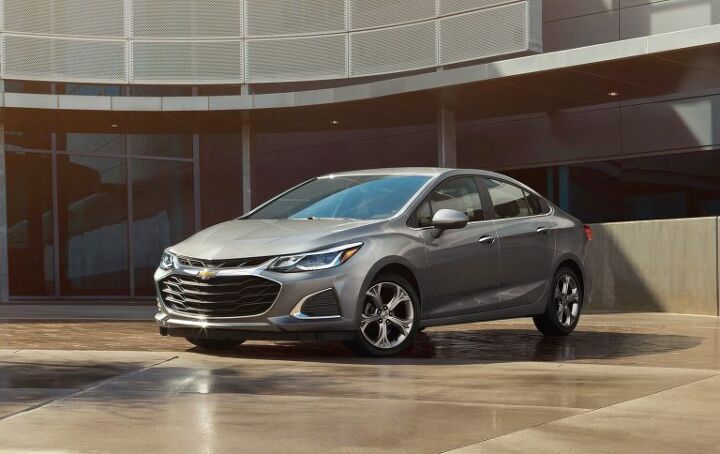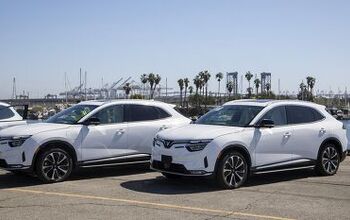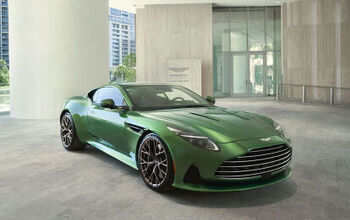U.S. Auto Sales Continue Downward Slide, But Canada's Winning the Race

Compared to previous months, May was a great month for U.S. light vehicle sales. Volume almost broke even on a year-over-year basis, falling a mere 0.3 percent. Keep in mind that last year was a high water mark for the industry, and average transaction prices are nudging into premium territory.
Still, year-to-date sales are down in the U.S. to the tune of 2.4 percent, with May’s slim loss serving as the fifth consecutive monthly decline. To that, Canada says, “Hold my Molson.”
Last month was the Great White North’s 15th consecutive month of falling auto sales, with volume dropping 5.9 percent, year over year. Year to date, Canadian auto sales fell 4.4 percent. Unlike the U.S.’s slim volume gain for 2018, sales fell 1.9 percent — the country’s first sales loss since the recession.
It seems Canada has a head start on the long-awaited industry cool-off period.
What brands are doing well in Canada, you ask? It’s not a long list. According to data published by Automotive News Canada, if you’re a Korean brand, then value-seeking Canucks are your best friend. Sales of the Hyundai brand are up 8 percent, year to date, with Kia rising 6.1 percent through the end of May. Genesis? After 2018’s tumult, sales rose 48 percent, year to date. Mitsubishi, darling of the province of Quebec, is up 5.1 percent for the year.
Elsewhere in the sort-of value realm, Volkswagen’s sales rose 6.6 percent in May and 3.9 percent for the year. The Toyota brand rose 9 percent in May for a 4.5 percent YTD gain.
Elsewhere, mainstream brands cooled off, while domestic makes took a plunge. No one is worse off that Fiat Chrysler, which saw its brands slide a collective 25.4 percent in May. Year to date, FCA brands are down 14.4 percent. Not a single FCA marque came close to posting a sales gain either last month or this year.
Things aren’t all that much better at General Motors, which recorded a 14.1 percent May dip and a 13.1 percent YTD decline. In GM’s stable, only Cadillac saw a volume increase in May (18.7 percent), with sales through the end of the month up 22.3 percent. Buick has thus far managed to eke out a slight YTD volume increase (1.1 percent).
Ford’s fortunes aren’t as bleak. The country’s most popular brand was the only domestic marque to see a year-over-year increase last month, with sales rising a mere 0.8 percent. That was enough to keep Ford’s YTD volume in the black (0.3 percent).
As brands like Honda, Chevrolet, Mazda, Subaru, and Nissan lick their wounds, tonier brands seem to have no trouble picking up new buyers. Infiniti’s up 3.6 percent for the year, Lexus is up 11.4 percent, and Volvo’s up 9.1 percent. Porsche? It’s up 5.5 percent. Tesla, a brand that does not count as a purveyor of everyman green vehicles, has seen its volume rise 132 percent thus far. Even Lamborghini, Rolls-Royce, Bentley, and Maclaren are enjoying sales gains in 2019.
The Big German Three? Sorry, Canadian buyers said “Nein!”
[Image: General Motors, Chris Tonn/TTAC]

More by Steph Willems
Latest Car Reviews
Read moreLatest Product Reviews
Read moreRecent Comments
- Spectator Wild to me the US sent like $100B overseas for other peoples wars while we clammer over .1% of that money being used to promote EVs in our country.
- Spectator got a pic of that 27 inch screen? That sounds massive!
- MaintenanceCosts "And with ANY car, always budget for maintenance."The question is whether you have to budget a thousand bucks (or euro) a year, or a quarter of your income.
- FreedMike The NASCAR race was a dandy. That finish…
- EBFlex It’s ironic that the typical low IQ big government simps are all over this yet we’re completely silent when oil companies took massive losses during Covid. Funny how that’s fine but profits aren’t. These people have no idea how business works.



































Comments
Join the conversation
The homegrown brands were bought out by GM in the 1920s. So, there are none, and essentially, never have been.
I am not surprised that sales are down, have you been inside any showrooms lately? GM was the worst with the most dismal lineup of aged feeling or uninspired SUVs out there, not to mention an auto-start system that can't be disabled. For $45-$55k (Canadian), I found nothing that felt like it was better than my current 2012 Jeep Grand Cherokee. The only vehicle I liked was a new Grand Cherokee, in the Summit trim and a V8 but in the end, I couldn't justify spending that much for such an aged vehicle when I already have the 2012 version that has low mileage and has never had an issue. I am going to wait two more years - by that time, the next Grand Cherokee and MDX will both be out, and hopefully some other competitors. I can't be the only one who wants to buy a new vehicle but can't find one I like!